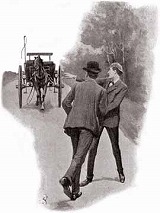I confess that I had not up to now taken a very serious view of the case, which had seemed to me rather grotesque and bizarre than dangerous. That a man should lie in wait for and follow a very handsome woman is no unheard-of thing, and if he has so little audacity that he not only dared not address her, but even fled from her approach, he was not a very formidable assailant. The ruffian Woodley was a very different person, but, except on one occasion, he had not molested our client, and now he visited the house of Carruthers without intruding upon her presence. The man on the bicycle was doubtless a member of those week-end parties at the Hall of which the publican had spoken, but who he was, or what he wanted, was as obscure as ever. It was the severity of Holmes’s manner and the fact that he slipped a revolver into his pocket before leaving our rooms which impressed me with the feeling that tragedy might prove to lurk behind this curious train of events.
A rainy night had been followed by a glorious morning, and the heath-covered countryside, with the glowing clumps of flowering gorse, seemed all the more beautiful to eyes which were weary of the duns and drabs and slate grays of London. Holmes and I walked along the broad, sandy road inhaling the fresh morning air and rejoicing in the music of the birds and the fresh breath of the spring. From a rise of the road on the shoulder of Crooksbury Hill, we could see the grim Hall bristling out from amidst the ancient oaks, which, old as they were, were still younger than the building which they surrounded. Holmes pointed down the long tract of road which wound, a reddish yellow band, between the brown of the heath and the budding green of the woods. Far away, a black dot, we could see a vehicle moving in our direction. Holmes gave an exclamation of impatience.
“I have given a margin of half an hour,” said he. “If that is her trap, she must be making for the earlier train. I fear, Watson, that she will be past Charlington before we can possibly meet her.”
From the instant that we passed the rise, we could no longer see the vehicle, but we hastened onward at such a pace that my sedentary life began to tell upon me, and I was compelled to fall behind. Holmes, however, was always in training, for he had inexhaustible stores of nervous energy upon which to draw. His springy step never slowed until suddenly, when he was a hundred yards in front of me, he halted, and I saw him throw up his hand with a gesture of grief and despair. At the same instant an empty dog-cart, the horse cantering, the reins trailing, appeared round the curve of the road and rattled swiftly towards us.

“Too late, Watson, too late!” cried Holmes, as I ran panting to his side. “Fool that I was not to allow for that earlier train! It’s abduction, Watson - abduction! Murder! Heaven knows what! Block the road! Stop the horse! That’s right. Now, jump in, and let us see if I can repair the consequences of my own blunder.”
We had sprung into the dog-cart, and Holmes, after turning the horse, gave it a sharp cut with the whip, and we flew back along the road. As we turned the curve, the whole stretch of road between the Hall and the heath was opened up. I grasped Holmes’s arm.
“That’s the man!” I gasped.
A solitary cyclist was coming towards us. His head was down and his shoulders rounded, as he put every ounce of energy that he possessed on to the pedals. He was flying like a racer. Suddenly he raised his bearded face, saw us close to him, and pulled up, springing from his machine. That coal-black beard was in singular contrast to the pallor of his face, and his eyes were as bright as if he had a fever. He stared at us and at the dog-cart. Then a look of amazement came over his face.